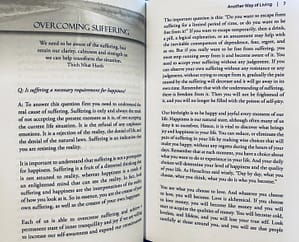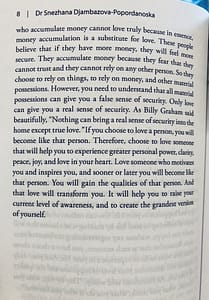What are ways in which one can overcome suffering? Recently I received the following email by my one of my dear students from Singapore, who is currently doing her Master in Psychology at the University of Melbourne in Melbourne, Australia. I have been deeply touched by her writing, as in her article she was able to point out clearly the real cause of human suffering (inspired by one chapter in my latest book “Another Way of Living.”) With her permission, I would like to share her insights with all of you, my lovely readers. What follows is her email and her post.
Hi Dr Snezhana,
I recently wrote a short post for one of my Gender Studies subject, ‘Sex and Gender: Past and Future’. In this subject, we talk about the history of feminism, concepts of sex/gender/sexuality, and representations in our society. One assignment was a fortnightly blog post where we write our reflections about the topics discussed in class and share in on the school portal so everyone can have the chance to learn from others. I was initially stuck for ideas for a particular week’s post, and was going through my lecture slides when this term caught my attention, “cruel optimism”.
Then, the most amazing thing happened. I suddenly thought of you, and your book “Another Way of Living” was just in front of me at my study desk. So, I decided to flip through it. I felt like something spoke to me, to focus on the chapter “Overcoming Suffering”. Perhaps as ‘optimism’ and ‘happiness’ are interconnected terms, concepts that we have discussed in our journey, it felt like I need to share it with everyone too. In thinking about ‘cruel optimism’, I felt that your words offered the solution to resist this phenomenon that happens to everyone, every day. And if I had the most beautiful blessing of meeting you, I think those who have yet to, can do so through the chapter I’ve included in my post.
“Cruel Optimism” comes from Lauren Berlant’s book (2011) with the same title. She describes it as a phenomenon where one’s desire is actually an obstacle hindering happiness or causing unhappiness. “People have remained attached to unachievable fantasies of the good life—with its promises of upward mobility, job security, political and social equality, and durable intimacy—despite evidence that liberal-capitalist societies can no longer be counted on to provide opportunities for individuals to make their lives “add up to something.” This resonated with what you’ve always reminded me, and I feel, taught me to think of being happy as a journey of happiness, rather than a pursuit of happiness. In pursuing happiness, I feel like it overshadowed my sight to notice the most important thing – it’s not things or creating situations that will make me happy. It’s myself, coming from within, and radiating the happiness through a constant journey of mindfulness.
I’ve attached the post I wrote in this email, as I want to share it with you, to thank you for gifting me the perfect words in your book that in turn, gave me so much inspiration and also reminded me of the important things.
Warm Regards,
Jerlene Chong,
Singapore
Three forms of “cruel optimism”
In the last lecture, we discussed Laurent Berlant’s concept of “cruel optimism”. The question “Where/when/how are we encouraged to maintain a “cruel optimism” about the future?” lingered in my head. Recalling Ahmed’s paper on cruel optimism she examined the history of happiness to elaborate on the concept of happiness, and unhappiness. While reading the paper, words from a beloved friend whom I see as my family resonated in my head, “Happiness is a state of mind.” It took me years to comprehend this simple statement; I had no inkling, no ability to realize the potential behind these simple words. Now, I recognize that the pursuit of happiness is, like most things, is a social construct. The journey towards achieving happiness is therefore derailed, as we evaluate and measure our happiness in accordance with the scales provided by societal standards of what happiness should be. I would also like to share an excerpt from a tremendously enlightening book, Another Way of Living: A Journey to Infinite Peace, Immense Joy and True Freedom written by a dear friend I’m blessed to have met here in Melbourne, Snezhana Djambazova-Porpordanoska.
Get the book “Another Way of Living” by Dr Snezhana Djambazova -Popordanoska.
Now, to answer Hannah’s question, I decided to analyze some perceived desires and attachments that, in theory, should provide happiness by thinking about the self, the social, and the world we live in. These desires and attachments are subsequently sieved out so I can elaborate on just three aspects – secured identity, relationships/kinships, and being recognized as successful in society.
Firstly, secured identity led me to review the broad definitions and categories of gender that still cease to account for diverse complexities. One might argue that knowing your gender identity might be enough to present a secured sense of identity, but I see the implications in these convoluted representations. Understanding sex and gender inevitably prompt leading opinions about sexuality. However, these concepts are generally framed through a process of categorization. In 2016, The Australian Sex Survey included a question about gender with 33 responses, further defined by The Gender Centre:
In all honesty, it irks me to no end that people require definitions to make meaning because, once again, it reinforces the categorization of people, which ultimately divide and segregate. Why can’t people just be people? Moreover, since our identity is constructed within societal terms, we are obligated to fit into reductive categories that reinforce heteronormative binary notions.
Secondly, relationships/kinships develop and influence our values in life. This brings me to expand on the concept of love as a social construct, marriage as an institution, and family as an idealized social unit. Revlon Australia and New Zealand’s advertisement Choose Love stars brand ambassadors Gwen Stefani, Alejandra Espinoza, and Ciara, each of them offering a unique viewpoint of love:
Gwen: “…I chose to make something good out of something bad because that’s what we’re supposed to do.”
Alejandra: “…Love is a commitment. You choose to love a person… If you want to stay with someone, you got to make it work.”
Ciara: “…Don’t settle when it comes to love. Just loving yourself gives you a chance to be so confident in the universe, and to attract those things that you really want and deserve. I think once you work on yourself, you’re really able to do everything else. And you’re also able to love your partner the right way.”
Personally, I enjoyed Ciara’s ad the most because it is aligned with unconditional love that I feel too many of us have yet to fully understand, and therefore are unable to give. She also talks about her wedding day, which entirely illustrated the point that marriage and weddings would irrevocably provide happiness. I think the idea of “cruel optimism” can only be applied here if people don’t necessarily feel the same way she describes. However, I think Gwen’s love advice is misleading and feeds into the notion of trying in a relationship should be enough for everyone and therefore risk being unhappy in an assumed situation of happiness.
I grew up in Singapore, a multicultural, industrialized country that is an engineered society with a conservative culture. The nuclear family concept is exceptionally valued as the “basic building blocks of society”, establishing itself as a powerful institution. This singular definition of the family is utilized as a tool for building relationships, moral education, societal norms, and filial piety in order to become upright citizens with politically correct mentalities. In educating kinship values, some principles promoted include abstinence and safe-sex practices, and preparation for marriage, which underpins the moral code in developing romantic relationships. As such, being situated in a hegemonic, normative family, or seeking to build your own nuclear family positions individuals on a positive social standing that presumptively provides hope for a happy future. As such, the idea of monogamous marriage is entwined with building your own nuclear family, resulting in a complicated structure that regulates both sexuality, and social status. Conversely, how might we consider confusing ‘marriages’ between a trans individual who has already undergone sex reassignment surgery with another individual of their opposite sex? The answer: a nullified marriage, (or before it’s even at that point) or inability to marry legally, and the incapability to bid for government public housing due to the legal view of the illegitimate couple.
Lastly, the ‘final step’ in having a fulfilled life considers the drive to be recognized as a successful individual in society. In the lecture, we discussed The American Dream and The Australian Dream, so I was curious to find out what The Singaporean Dream meant. Traditionally in the 80s-90s, it describes contingency plans made in the event of retirement, after a wretched life as a workaholic, in attempts to attain 5C’s – Car, Cash, Condominium, Credit card and Country club membership. In contemporary Singapore, the millennials are resisting these antiquated ideals, choosing instead to “chase their dreams”. This paved more roads to an almost infinite number of possibilities and options that are more parallel to altering perceptions about success. In reflecting about this as a kind of “cruel optimism”, the first thought that sprang in my head was, “Well, anyone can chase their dreams if they have the money.” Hence, while jumping out of the box might have broadened our perceptions, capitalistic society still restricts and limits. All in all, I think in whatever juncture you are in life, with whatever amount of knowledge you might or might not have, with whatever resources you have available to you, we fight to struggle so we might live another day before we die.
Jerlene Chong,
Singapore



